Staying Fit

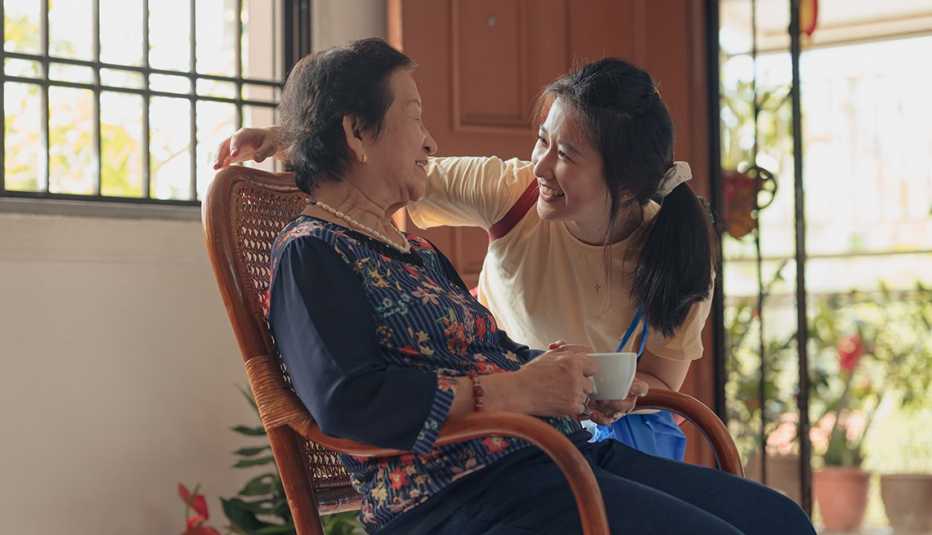
A starting point
You can find a lot of information about dementia on the Internet, and many helpful resources exist for individuals and families – often in your own community.
However, it can be tough to know where to start. That’s why AARP developed this simple guide to help you and your family navigate the dementia care journey.
We hope this guide will assist you in the following ways:
- Help you locate the type of assistance you need. This directory lists pertinent government and nonprofit resources, which you can access both in-person and online.
- Help you connect with others. You’ll discover that you’re part of a community of individuals and families facing many of the same issues. You are not alone.
- Empower you and give you hope. It is possible to live well with dementia. Early detection and diagnosis can make a positive difference in terms of planning, treatment options, family relationships and quality of life.
The AARP Dementia Resource Guide for Individuals and Families explains how to connect with programs and services that you and your family may find helpful, for example, to make your house safer for people living with dementia and to connect with people facing the same challenges.
3 Ways to Get the Free Guide
- Download a printer-friendly version here.
- Request a print copy by calling AARP at 877-333-5885 and select option 1
- Scroll down to read the digital guide
Not all resources referenced in this guide are offered by AARP. Be aware that any information you provide to the host organizations will be governed by their privacy policies.
What Is Dementia?


Dementia is a general term describing a loss of cognitive and behavioral function in an adult that is severe enough to interfere with the person’s daily life and activities.
Alzheimer’s is one type of dementia, and it’s the most common one. It accounts for 60 to 80 percent of the cases diagnosed. The hallmark symptom of Alzheimer’s dementia is memory loss.
Other types of dementia include vascular dementia, dementia with Lewy bodies, frontotemporal dementia, Huntington’s disease, Parkinson’s disease dementia, chronic traumatic encephalopathy (CTE) and mixed dementia.
Two-thirds of adults age 18 and over personally know someone who has had Alzheimer’s disease or another type of dementia.
Did you know?
- Dementia is not a normal part of aging. It is caused by diseases or damage to the brain.
- Dementia is not just about memory loss. The specific mental and physical symptoms that someone with dementia may experience depend on the parts of the brain that are damaged and the disease that is causing the dementia.
- People with dementia have twice as many hospital stays per year as other older adults. Falls are a leading cause of hospitalization for people living with dementia.
- The vast majority of older adults do not have dementia, and most will never develop it. However, the older you get, the likelihood of developing dementia increases.
- Regardless of our age, there are things we can do to help mitigate age-related cognitive decline and support our cognitive health.
See the Endnotes section for further reading about the points above.
Tips to Find Services and Support

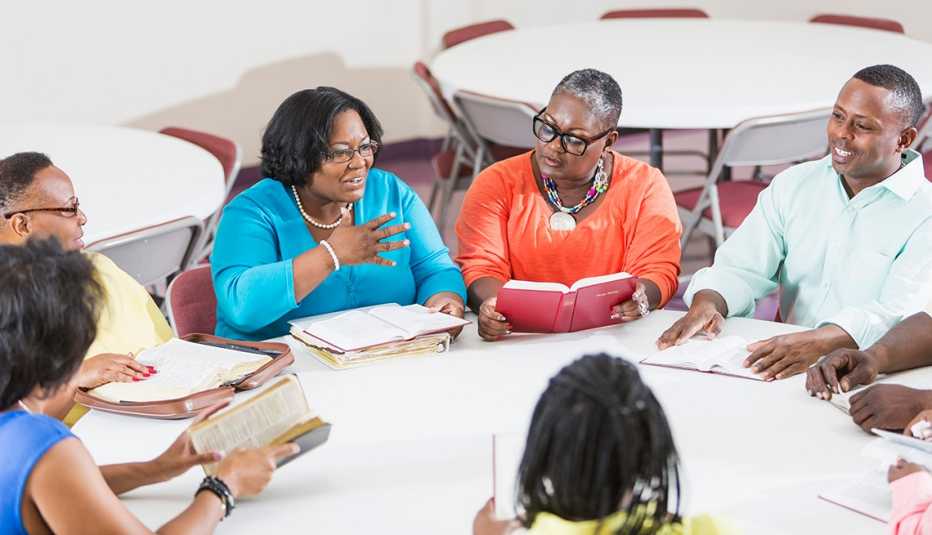
Here are a few pointers to keep in mind as you begin to look for resources and support.
Ask for help.
Friends and family will often ask you if there is anything that they can do to help. Use your network and ask others to help you look for resources and information in your area.
If possible, use the Internet.
The Internet is an easy and quick way to get information. Because information can vary, it is important not to rely on one site alone. Also, make sure the sponsoring organization is a reputable and reliable source of information.
Talk to a real person.
Many phone numbers will lead to voicemail. It’s important to leave a message, but don’t wait for someone to call you back. Keep in mind that some services have backlogs of calls to return. Keep calling back until you connect with someone who can help you.
Write down your questions in advance.
Before you call, write down specific questions and try to be as concrete and detailed as possible.
Keep track of your conversations.
Keep a notebook of who you talked to. Write down names, phone numbers, and notes from each call. You never know when you will need the information down the road.
No one person or organization has all the answers.
The person you get on the phone or the website you visit may have expertise in certain areas, but not in others. It is always smart to be prepared with other resources and organizations that can help.
Use your creativity.
Create your own personal resource network. This could include contacting community-based agencies to find out what kinds of support services are available in your area. Consider asking friends or other caregivers what resources they found useful.
Many services are local.
Services can vary widely from state to state and community to community. Make sure you look for resources that provide services where you live.
Dementia-Specific Organizations

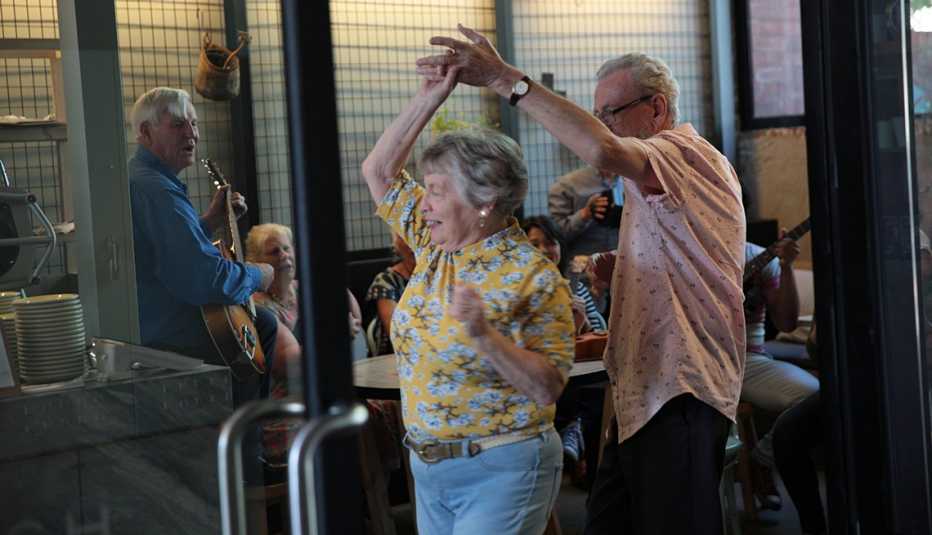
Alzheimer’s Association
Provides information about Alzheimer’s and other dementias including ongoing research, programs, and resources including care navigator tools, support groups and a 24/7 helpline.
- Website: alz.org
- 24/7 Helpline: 1-800-272-3900
- Connect with a local chapter in your state
Lewy Body Dementia Association (LBDA)
Provides information about Lewy Body Dementia (LBD) – the 2nd most common type of progressive dementia after Alzheimer’s disease – including ongoing research, symptoms, and support groups.
- Website: LBDA.org
- Helpline: 1-800-539-9767
- Find a support group in your state
The Association for Frontotemporal Degeneration
Provides information about Frontotemporal Degeneration (FTD) — most commonly diagnosed in people under age 65 — including ongoing research, symptoms, and support groups.
- Website: TheAFTD.org
- Helpline: 1-866-507-7222
- Connect with a local chapter in your state
Concussion Legacy Foundation
Provides information about living with Chronic Traumatic Encephalopathy (CTE), a degenerative brain disease found in athletes, military veterans, and others with a history of repetitive brain trauma.
Parkinson’s Foundation
Provides information about living with Parkinson’s disease, hospital care kits and ongoing research. Note: 13 states and local regions also maintain robust “Independent Regional Parkinson Organizations.” Google that phrase to find out if there is one near you.
- Website: Parkinson.org
- Helpline: 1-800-4PD-INFO (473-4636)
Huntington’s Disease Society
Provides information about the hereditary neurodegenerative disorder known as Huntington’s disease, including symptoms, genetic testing information and support groups.
- Website: HDSA.org
- Helpline: 1-800-345-HDSA (4372)
- Connect with a local chapter in your state
Dementia Action Alliance
A national organization of people living with dementia, care partners, and dementia specialists that helps individuals and families living with dementia connect and engage. Offers virtual discussion groups and resources for living well with dementia, including information about assistive technology.
- Website: DAAnow.org
Dementia Friendly Communities
A growing number of local communities have joined the Dementia Friendly America network, which means they’ve taken special steps to foster inclusion and support for residents living with dementia.
Memory Cafés
Memory cafés, a concept started in the Netherlands in the 1990s, offer a comfortable space where people living with dementia and their care partners, friends and family can socialize, enjoy a meal together, or engage in activities such as games or concerts.
National Council of Dementia Minds
A nonprofit organization led by people living with dementia. Dementia Minds groups meet regularly via Zoom and provide dialogue and education about strategies for living well with dementia, including overcoming stigma and finding new ways to live with meaning and purpose.
- Website: DementiaMinds.org
Other Helpful Resources

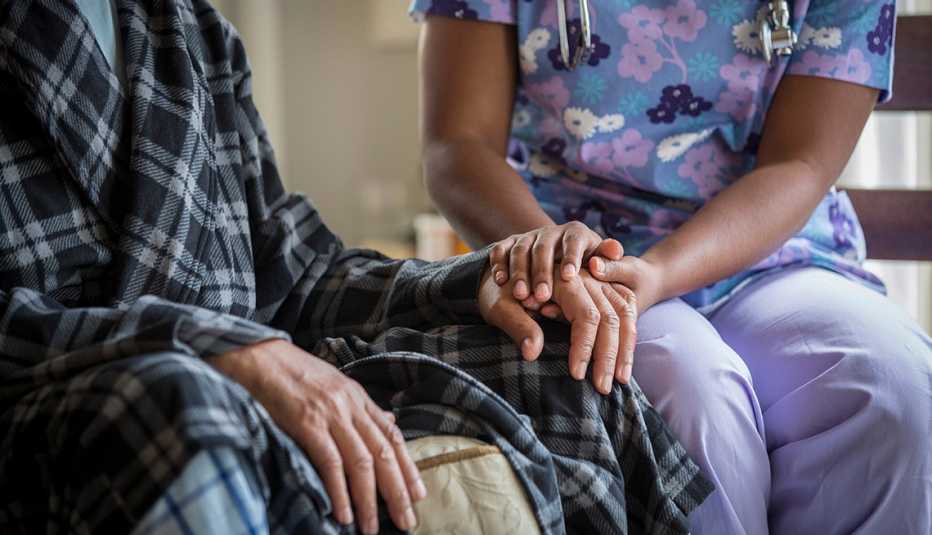
Alzheimers.gov
The official federal government website about Alzheimer’s disease and related dementias. Managed by the National Institute on Aging, National Institutes of Health and U.S. Dept. of Health & Human Services.
- Website: alzheimers.gov
Area Agencies on Aging (AAAs)
AAAs were established under the Older Americans Act in 1973 as “one-stop shops” to help connect older adults with needed services in their local communities. Your local AAA can connect you with in-home services and community services such as Meals on Wheels and other help with meals, bathing, and household tasks; respite care including adult day programs; and training and support for family caregivers.
To find the Area Agency on Aging in your community:
- Eldercare Locator: eldercare.acl.gov
- National Call Center: 1-800-677-1116
LongTermCare.gov
An online clearinghouse for information and tools to plan for your or your loved one’s long-term care needs, maintained by the federal Administration for Community Living.
- Website: acl.gov/LTC
State Health Insurance Assistance Programs (SHIP)
Every state has a SHIP agency that provides free, confidential, personalized counseling to help residents navigate the Medicare and Medicaid systems, as well as veterans’ health benefits and private insurance. These agencies are funded by state and federal grants, and not affiliated with the insurance industry. SHIP counselors can explain your health plan options, help you understand hospital bills and Medicare notices, help identify resources for prescription drug assistance and more.
- Find the SHIP agency in your state: shiphelp.org
Nursing Home Compare
A searchable database with information on every Medicare- and Medicaid-certified nursing home in the country, as well as home health agencies, hospitals, hospice and rehab facilities. Provides quality ratings so you can compare the options in your area. Maintained by the federal Centers for Medicare and Medicaid Services.
- Website: Medicare.gov/care-compare
Medicare
Provides information about the Medicare program and how to find Medicare plans and providers.
- Website: medicare.gov
- 1-800-633-4227
Social Security Administration
Provides information on retirement and disability benefits, including how to sign up for Social Security.
- Website: ssa.gov
- 1-800-772-1213
Veterans Administration: Geriatrics and Extended Care
Provides information about long-term services and supports for older military veterans, including home-based care, VA nursing homes, and respite care.
- Website: VA.gov/geriatrics/
- 1-800-698-2411
Veterans Administration: Caregiver Support Program
Provides supports and services for individuals or families caring for veterans. Connects caregivers with local caregiver support programs for veterans.
- Website: caregiver.VA.gov
- 1-855-260-3274
National Alliance for Mental Illness (NAMI)
Dementia is not the same thing as mental illness, but some people with dementia may also experience some type of mental illness, such
as depression. The NAMI HelpLine is a free, nationwide peer-support service that provides information and referrals for people living
with mental illness, their family members and caregivers.
The NAMI HelpLine can be reached Mon-Fri, 10am–10pm ET, at:
- Website: nami.org/help
- 1-800-950-NAMI (6264)
National Academy of Elder Law Attorneys
A nonprofit association of lawyers and organizations that provide legal services for older adults and people with special needs. You can use its searchable database to find lawyers in your area who specialize in long-term care, power of attorney and other aging and caregiving issues. Individual attorney fees will vary.
- Website: NAELA.org/findlawyer
AARP Foundation Benefits QuickLINK
Find public benefits that can help you pay for food, medicine, health care, utilities and more by using the AARP Foundation Benefits QuickLINK tool.
- Website: AARP.org/quicklink
Community Resource Finder

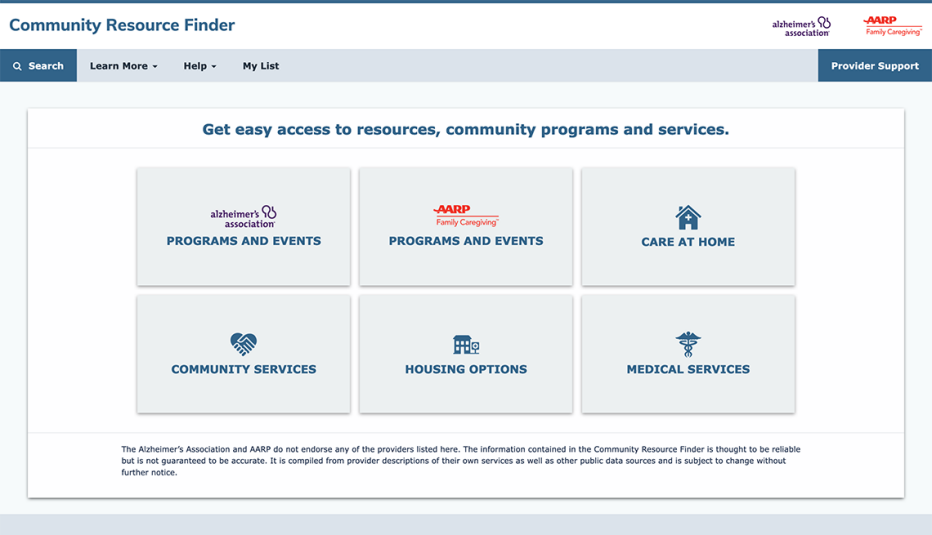
Community Resource Finder
The joint Alzheimer’s Association & AARP Community Resource Finder is an online tool to help individuals and families locate resources in their community. It is free to use and searchable by zip code.
Find it online at: CommunityResourceFinder.org
CommunityResourceFinder.org – Provider Categories
- Adult Day Care Programs
- Area Agencies on Aging
- Assisted Living
- Dementia Diagnostic Center z Early Stage Programs
- Elder Law Attorneys
- Geriatric Care Managers
- Geriatric Psychiatrists z Geriatricians
- Home Care
- Home Health Care
- Hospice
- Hospitals
- Independent Living
- Neurologists
- Skilled Nursing Care
- Social Engagement Programs z Support Groups
- Transportation
Alzheimer's Disease Research Centers

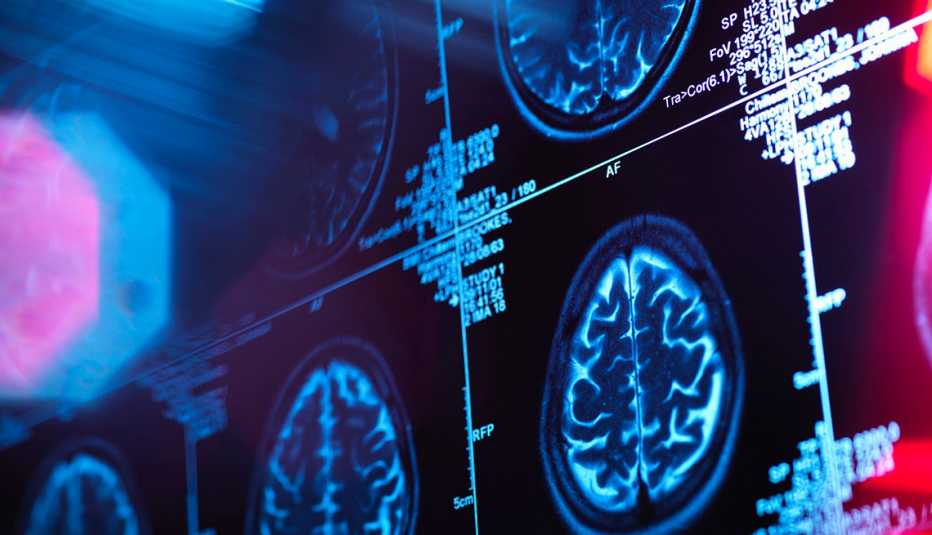
The National Institute on Aging funds 33 Alzheimer’s Disease Research Centers (ADRCs) at major medical institutions across the United States. At these centers, doctors and other researchers work to translate the latest advances in research into improved diagnosis and care for people with Alzheimer’s disease and other types of dementia. ADRCs offer people affected by dementia and their families:
- Up-to-date information about Alzheimer’s disease and other types of dementias.
- Help with obtaining a diagnosis and medical management.
- Opportunities for volunteers to participate in clinical trials, studies and research registries.
- Support groups and other special programs for volunteers and their families.
To locate an ADRC near you, visit: nia.nih.gov/health/alzheimers-disease-research-centers
Other ways to find out about current clinical research include:
TrialMatch.alz.org
TrialMatch® is a free clinical studies matching service offered by the Alzheimer’s Association. It connects people with Alzheimer’s, their caregivers or care partners, and healthy volunteers to current studies you may be interested in.
ClinicalTrials.gov
This is a U.S. National Library of Medicine database of privately and publicly funded clinical studies conducted around the world. (To find current studies in your area, use the name of your state as a search term.)





























































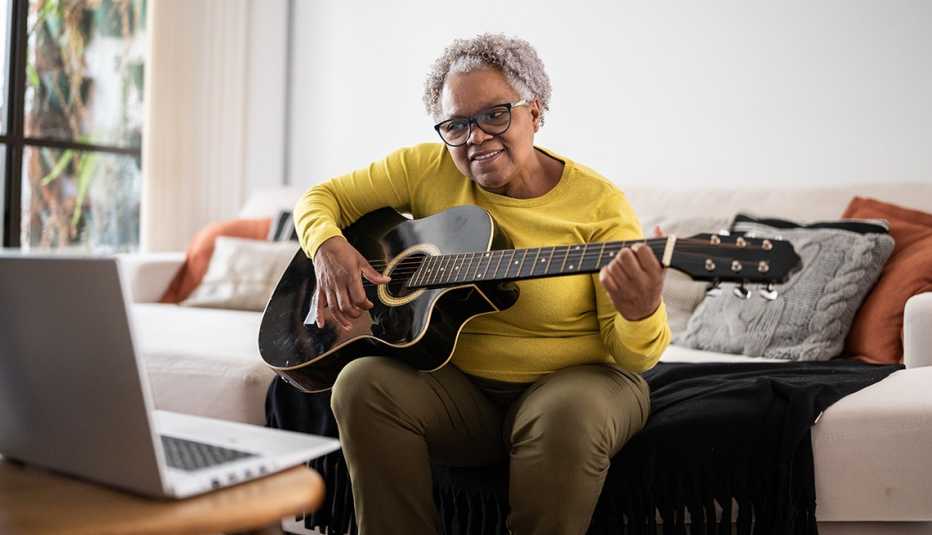
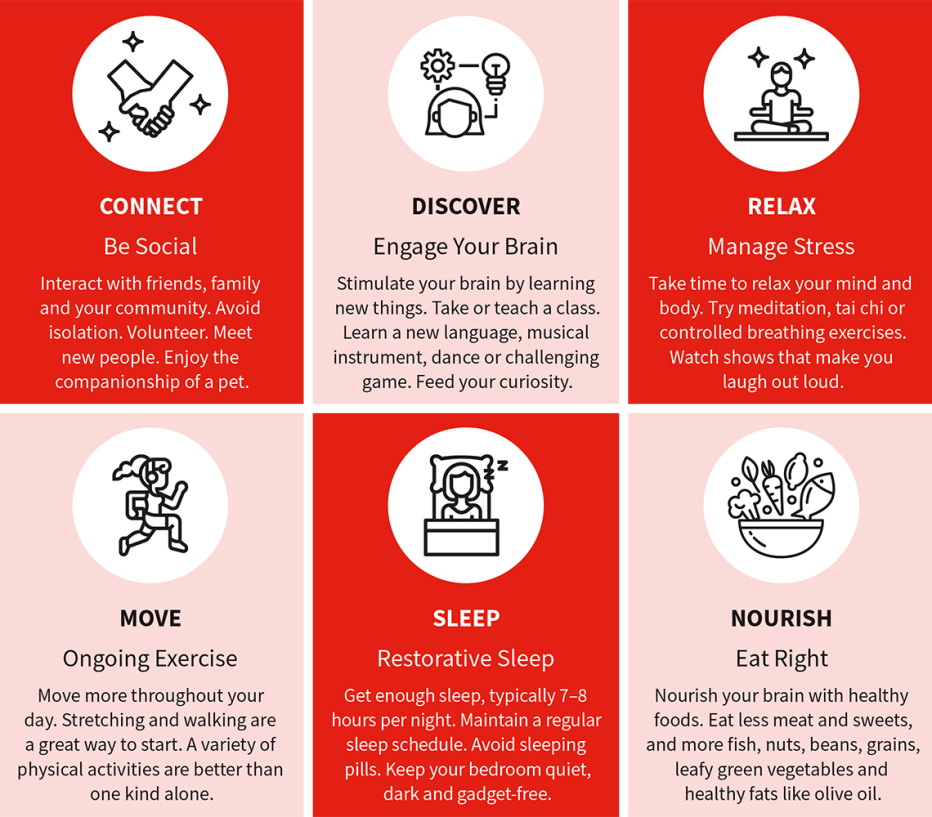









More From AARP
Take the Cognitive Assessment
Member Benefit: Find out how you perform in five key areas, including memory and attention.
Calling All Citizen Scientists!
Member Benefit: Participate in the future of brain health.
Tips for Traveling With Someone Who Has Dementia
A well-planned vacation can do the whole family good.